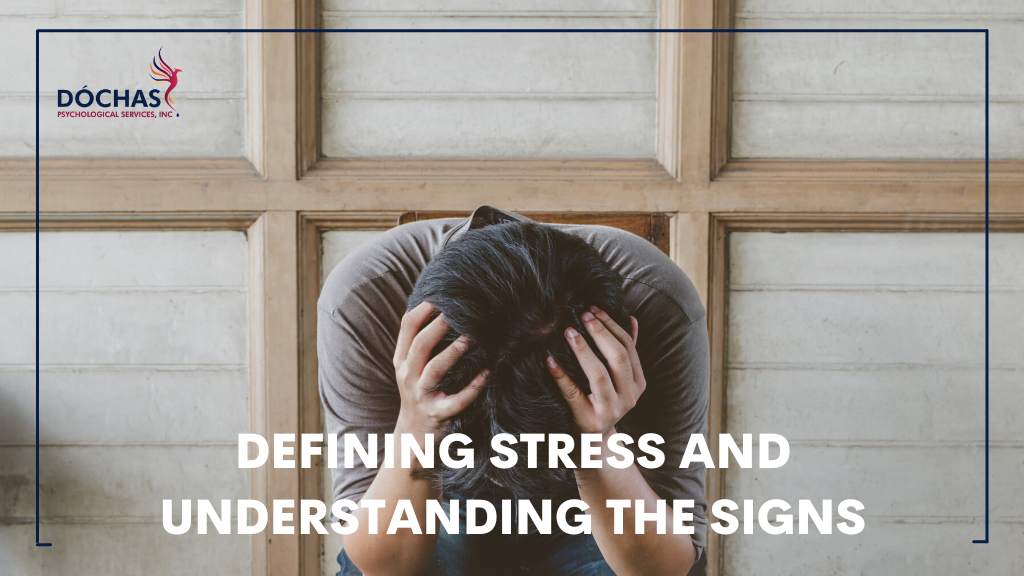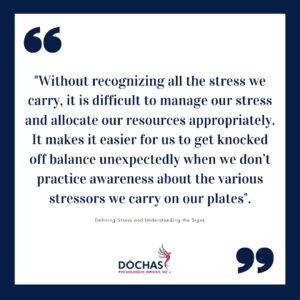Have you ever felt confident handling all the stress in your life, and then something small comes up or gets forgotten, and suddenly you are knocked completely off balance? This has happened to me more than once, and when it does, I usually take a step back to consider all the stressors I have on my plate. Hey, it’s Rachael on the Dóchas blog! Today I will take you on a journey in defining stress and understanding the signs so you can feel more prepared when something catches you off guard and surprises you.
Defining Stress
As humans, our bodies try to maintain homeostasis, an internal state of balance regardless of the demands of our environment, like balancing a plate on your finger. As we add to the different demands and tasks of our lives, we add to or change our stress level, which impacts this balance. Sometimes it is okay, and other times our balance is thrown off.
Generally, when we think about our current stressors, we usually only consider the big changes, such as upcoming work projects and abnormal life changes. These are both examples of stressors that are often overlooked and are something we carry daily. When we take a step back to consider what we have on our plate, it is important to consider all the different types of stress.
Types of Stressors
There are several types of stress that we carry on our plates daily that are often overlooked. When defining stress and understanding the signs, we can break it into three main categories primarily based on timing.
Acute Stress: These are the frequently occurring short-term stresses that are only on our plates briefly.
-
- Personal Acute Stress: These include stresses or inconveniences that temporarily disrupt our balance that is within our control, such as; needing to get gas, running late, or engaging in a fun activity like going to the waterpark.
- Non-personal Acute Stress: These are the small inconveniences that come up outside our control. They include things like getting stuck in traffic, getting a cold, or rain on your day off.
- Not-knowing Stress: This is the stress we experience when we don’t know everything about a situation. This is the stress we experience when meeting friends at a new place or attending a job interview.
Episodic Stress: These are acute stresses that are experienced at a higher frequency but will eventually end.
-
- Professional Stress: This is the re-occurring stress we experience at work from the demands of our job. It includes things like project deadlines, homework, or additional projects.
- Interpersonal Stress: This is the re-occurring stress we experience in interpersonal relationships. It includes social commitments, like sports teams or hanging out with friends.
- Personal Stress: This is an extended period of acute stress experienced in our personal life. It may include things like getting ready and planning a vacation or temporary changes in your daily routine.
Chronic stress: These are the long-term stresses that we carry with us for weeks or even months. They include:
-
- Daily Hassles: These are the day-to-day hassles that we manage constantly. They often seem minimal and are often overlooked. They include tasks like going to and from work, cooking dinner, basic self-care, or managing money.
- Long-term Stress: These are the long-lasting stresses we must manage for the foreseeable future. Examples of these stressors are major home renovations, managing health conditions, or school.
- Ripple-effect Stressors: These stressors create changes in various areas of our life. They often include major changes, such as getting married, starting a new job, temporarily relocating, or moving.
Moving Forward
Without recognizing all the stress we carry, it is difficult to manage our stress and allocate our resources appropriately. It makes it easier for us to get knocked off balance unexpectedly when we don’t practice awareness about the various stressors we carry on our plates. Hopefully, understanding the different types of stress helps you to recognize all the things on your plate better. If you need help recognizing and managing the stress on your plate, we can help! If you are struggling with managing your stress, I encourage you to reach out and ask us how we can help. You can contact us here by calling us at 780-446-0300 or emailing us at info@dochaspsychologicalservices.com.
About Dóchas Psychological
Dóchas Psychological Services is a well-established and trusted therapy clinic located in Spruce Grove, Alberta. At Dóchas we value the idea that everyone deserves a safe space. Through connection and education, our team works hard to build a trustworthy relationship with each of our clients. It is our goal to create a community for our clients to feel like they belong.
Disclaimer
Information provided through Dóchas Psychological Services blogs or vlogs is meant for educational purposes only. They are NOT medical or mental health advice. You can read more about our disclaimer here.











